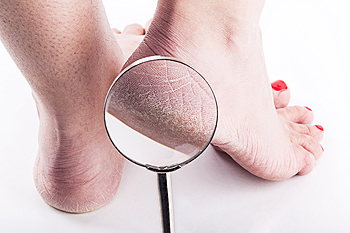 Patients who have severely dry skin on the heels of the feet are prone to a condition that is referred to as cracked heels. It can happen for a variety of reasons, including standing for extended periods of time throughout the day, and wearing shoes that have an open back. Additionally, existing medical conditions such as psoriasis, eczema, and thyroid disorders may play a significant role in the formation of cracked heels. Research has indicated the chances of developing this condition may increase for patients who are obese. Partial relief may be found when the feet are washed and dried thoroughly followed by applying a good moisturizer on and around the affected area. If you have cracked heels, it is suggested that you seek the counsel of a podiatrist who can guide you toward proper treatment options.
Patients who have severely dry skin on the heels of the feet are prone to a condition that is referred to as cracked heels. It can happen for a variety of reasons, including standing for extended periods of time throughout the day, and wearing shoes that have an open back. Additionally, existing medical conditions such as psoriasis, eczema, and thyroid disorders may play a significant role in the formation of cracked heels. Research has indicated the chances of developing this condition may increase for patients who are obese. Partial relief may be found when the feet are washed and dried thoroughly followed by applying a good moisturizer on and around the affected area. If you have cracked heels, it is suggested that you seek the counsel of a podiatrist who can guide you toward proper treatment options.
If the skin on your feet starts to crack, you may want to see a podiatrist to find treatment. If you have any concerns, contact one of our podiatrists from Pennsylvania. Our doctors can provide the care you need to keep you pain-free and on your feet.
Cracked Heels
It is important to moisturize your cracked heels in order to prevent pain, bleeding, and infection. The reason cracked heels form is because the skin on the foot is too dry to support the immense pressure placed on them. When the foot expands, the dry skin on the foot begins to split.
Ways to Help Heal Them
- Invest in a good foot cream
- Try Using Petroleum Jelly
- Ease up on Soaps
- Drink Plenty of Water
Ways to Prevent Cracked Heels
- Moisturize After Showering
- Skip a Shower
- Keep Shower Water Lukewarm
- Don’t Scrub Your Feet
If you are unsure how to proceed in treating cracked heels, seek guidance from a podiatrist. Your doctor will help you with any questions or information you may need.
If you have any questions, please feel free to contact one of our offices located in Plymouth Meeting and Ambler, PA . We offer the newest diagnostic and treatment technologies for all your foot care needs.
